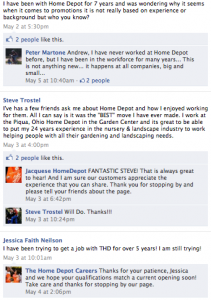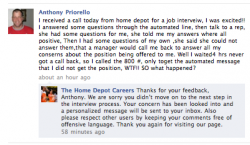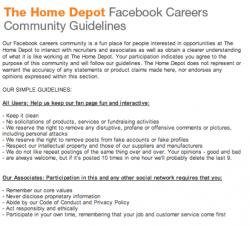 Home Depot has quietly been expanding its use of Facebook in online games and recruitment advertising on people’s profiles, meanwhile operating with transparency and responsiveness — returning emails in 24 hours — often missing elsewhere in online recruiting.
Home Depot has quietly been expanding its use of Facebook in online games and recruitment advertising on people’s profiles, meanwhile operating with transparency and responsiveness — returning emails in 24 hours — often missing elsewhere in online recruiting.
Miko Covin, who manages the employment marketing group, is one of the key players. She and others in that group — people like Alison Foy — came up from recruitment ad agencies like Bernard Hodes, TMP, and JWT Inside.
Covin arrived in 2008 from JWT, wanting to use the basic marketing and advertising skills she’d learned at agencies and apply them to social media and recruiting. In early 2010 (late in the game, she admits) she opened up a personal Facebook page after a friend invited her to be a Facebook member. She also saw the agency world struggling, social media increasing its role in recruiting, and wanted to move Home Depot in the social media direction.
She spent 2010 on education. There were HR people in Home Depot who didn’t get social media; in fact, some even used the now-awkward word “The” preceding “Facebook.” “I don’t know about The Facebook,” one person said.
Covin kept talking up the importance of social media in recruiting.  By the spring of 2010 Home Depot began testing two things on Facebook, targeting people based on the information in their profiles. First, it tried advertising store jobs to females, part of an effort to reverse the perception as a company for male jobs. It casted a “huge net first,” Covin says.
By the spring of 2010 Home Depot began testing two things on Facebook, targeting people based on the information in their profiles. First, it tried advertising store jobs to females, part of an effort to reverse the perception as a company for male jobs. It casted a “huge net first,” Covin says.
It narrowed after that, targeting people — now both male and female — whose profiles indicated they were in HR, and were based in areas where an HR district manager was needed.
It brought on JWT, the recruitment marketing agency, to help with the Facebook project.
By August, satisfied with the approximately 100 resumes it had received over the summer from these efforts, the recruitment marketing team was feeling that Facebook was a success in recruiting, and it should be expanded.
By October 2010, it launched its Facebook careers page.
Building it Out
 What’s happened since and what is happening now is taking a lot of forms.
What’s happened since and what is happening now is taking a lot of forms.
There is, for example, the work Maya Garner is doing. She joined the team 3-4 months ago and is rolling out a series of five games “designed to add a little fun to the community,” she says. One, “Cart Hustle,” involves assisting customers with carts, showing the job’s not just mundane but can actually be fun. Another game is a do-it-yourself quiz. Another is “Paint Misbehavin,'” involving helping customers at the paint counter. Another is a “Helpful Homer” game about customer service.
While Home Depot wasn’t the first company to get a careers page up and running on Facebook (Deloitte New Zealand was among the early movers), it believes its games section is well ahead of what most U.S. companies are doing. (Reckitt, a UK company, was out of the gaming gate early.)
“The main purpose is to add a little fun,” Garner says. “Facebook has become such a big part of the online social media lexicon, if you will — people join to have fun catch up with old friends. It has provided an avenue for brands to have a little fun as well.”
Alison Foy, who I mentioned at the outset, is a project leader in the employment marketing group. She has run Facebook ads aimed at people who are bilingual, by targeting people who choose to view Facebook in Spanish. She also works on recruiting for job functions like supply chain employees. She’s upgrading the company’s LinkedIn pages, segmenting them by supply chain, IT, retail management, and merchandising. If you’re in IT, you’ll see the IT page. If you’re in, say, communications, you’ll see none of the pages I just listed. Expect this to happen in about a month.
Foy and others on the team also help out in keeping up the day-to-day goings-on with the site. JWT is helping with creative, analyzing results and metrics, and is helping to manage the Facebook posts.
Lifting an Orange Veil
Few companies’ hiring and interview processes are totally clear to job candidates, of course. Where one stands in the process, or even how to figure out where one stands, are ongoing mysteries to many candidates. But, Home Depot’s using Facebook to at least shed a little light on the process. As you’ll see in the conversations I’ve captured in the (click to enlarge) graphics, job candidates who’ve been left wondering what ever happened to their applications are asking the company, and getting some answers. Those answers are sometimes coming from Home Depot, and other times coming from others posting responses on Facebook.
 It’s a valuable and candid look at what job seekers and current employees experience at any company. In one back-and-forth, a job seeker wrote, “I applied online quite a few months ago, got the email, the phone interview, and that was it. i don’t mind not getting the job, but a simple form email saying thanks but no thanks would be appreciated. besides you guys lost out in not hiring me!”
It’s a valuable and candid look at what job seekers and current employees experience at any company. In one back-and-forth, a job seeker wrote, “I applied online quite a few months ago, got the email, the phone interview, and that was it. i don’t mind not getting the job, but a simple form email saying thanks but no thanks would be appreciated. besides you guys lost out in not hiring me!”
A Home Depot representative (Jacquese Brown) wrote back with an 866-number to call to check on her status.
In another post, shown here, a current employee complains about the company’s promotion policy. 
Brown, a branding specialist, spends about a third of time reading posts, responding to them, and thinking of related site enhancements or other site issues. She says the company’s open-book policy is not just about helping people get their questions answered, but about Home Depot improving. “It shows us where we can better our process,” she says. “It shows us opportunites where we can help the user experience be very transparent.”
Brown says the heavy communication has another benefits — big benefits. It’s a way of taking a briefly-established relationship between a Home Depot recruiter or another employee and keeping it up. Let’s say a Home Depot rep meets someone at a Hispanic MBA event. They can have the candidate “friend” them on Facebook and begin receiving information about upcoming events, jobs, and so on. Home Depot, for example, will send out communications to fans in a specific zip code or area. If a contact — a candidate — asks a question to Brown, or a Home Depot recruiter, through Facebook, Home Depot’s policy is to respond within 24 hours.
Brown and colleagues laugh when I ask if they get questions or comments that don’t meet the guidelines. “We get comments that are more interesting than others,” Brown says. “Day to day you really don’t really know what’s going to be posted.”
More Work
 Facebook’s expansion as a recruiting tool has led to quite a few new things that must change.
Facebook’s expansion as a recruiting tool has led to quite a few new things that must change.
A perfect example is the corporate career site. Covin says Home Depot needed to ensure consistency between the Facebook experience and the career site experience, the latter being the place where candidates end up applying. You can “have the flashiest site and flashiest advertising, but the corporate career site,” she says, “well, let’s just say it had great opportunities (for improvement).”
She said the company asked itself: “‘Are we completing the candidate experience on a high note?’ I can’t say we were.”
That site was redone, relaunching in 2011.
Meanwhile, Home Depot is researching what it will do to optimize its Facebook Careers pages for mobile phones.
Also, when you’re on the Facebook page for customers, there’s little sign of the careers page, a move that would turn a customer into an employee. That could change in the future.
I asked the Home Depot folks about metrics, and in particular, hires. They said that this is all about branding. They’re not measuring success by hires yet. The marketing group remembers, like it was yesterday, when it had 500 fans. Now, it has 16,000. The number rises about 2% weekly. Covin says that “we all knew that once we started, this would take more time. We knew it wasn’t going to be a one-hit thing where you just put it up there and you’re done.”
The spring tends to be the chain’s busy season, a little like tax season for accountants, but, says Covin, “employment marketing has never really had a downtime.”